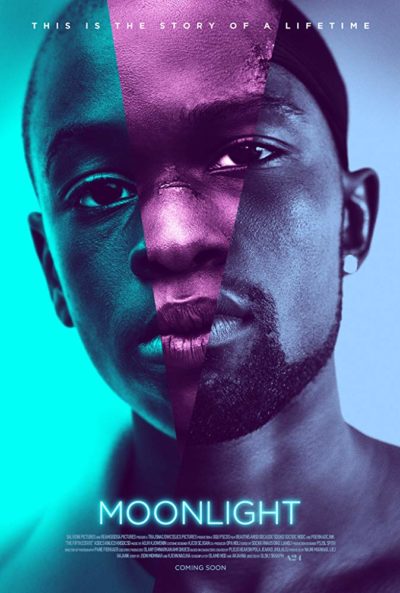
The best picture Oscar is the biggest prize any film can win. It does not follow though that films that have picked up that award are always well or fondly remembered. Of the recent winners, I don’t think Crash, Slumdog Millionaire or Shakespeare in Love, for example, are considered classics or appear on many best of lists.
At least Moonlight will not be forgotten thanks to the bizarre way it triumphed at last Sunday’s ceremony. Also, in many ways it was the perfect film for these times – following last years ‘Oscars So White’ controversy and the reaction to Trump’s election. The story of a young black boy, Chiron, growing up in a hard inner city environment in Miami, with a drug addicted mother, and absent father with the added challenge of being gay ticks all of the social issue boxes.
Made on a very low budget, Moonlight is a film that deserves your attention. Director Barry Jenkins’ roving camera helps maintain the interest, and James Laxton’s eye catching cinematography shows that remarkable results can be achieved even if you have little money to spend on a project. There are also excellent performances from the rightly lauded Mahershala Ali and Jharrel Jerome amongst a mostly good cast. An exception to that is Naomi Harris who didn’t convince me for one second as Chiron’s troubled Mum.
Whilst it is one I would recommend seeing it did not have the emotional impact on me that the two outstanding films of the year under consideration for the latest Academy Awards – Manchester By the Sea and I, Daniel Blake – did. It suffers from some basic flaws. The structure of the film, splitting it into three parts to show the story of the central character as a child (Little), as a teenager (Chiron) and as a man (Black), is in some respects a neat way of depicting one person’s life. It does also, however, encourage the viewer to compare the sections. I found the middle one much more interesting than the others, despite the fact that Ali only appears in the first part, and would happily have the whole film based on that part. Part one is a little obvious and the final segment ends well but takes a long time getting there.
The second big flaw is that the least interesting person in the film is Chiron. Uncommunicative to a point that becomes irritating, I found myself wanting to know more about Ali’s drug dealer or Chiron’s friend, Kevin. Finally the changes, physically and in outlook that Chiron makes between the second and third parts of the film do not ring true.
Ultimately, plaudits must go to Jenkins for achieving a lot, and for his ambition, as well as the Academy for honouring a film with its heart in the right place, but I find it hard to agree with the decision.
Rating: 7 out of 10